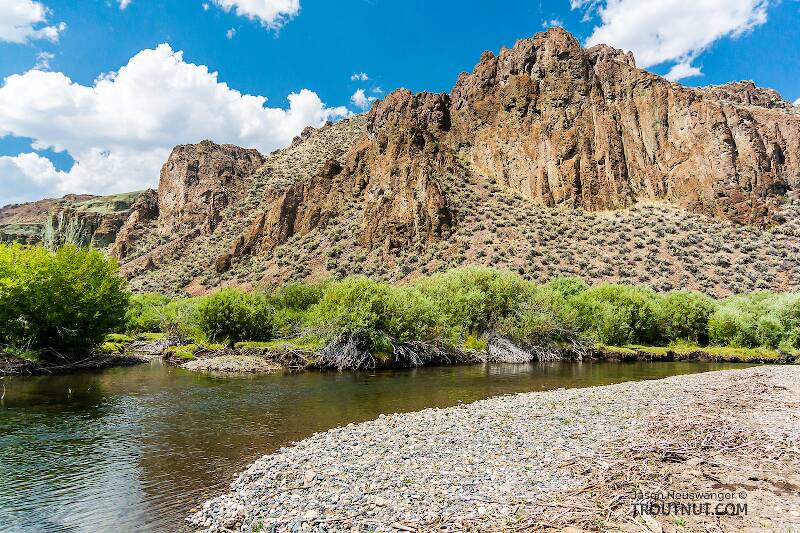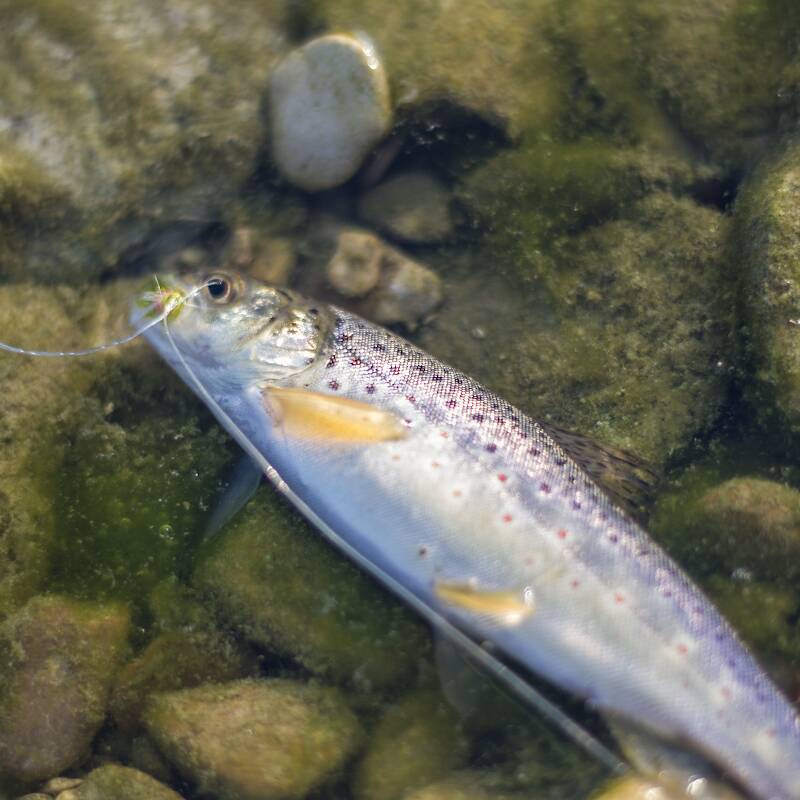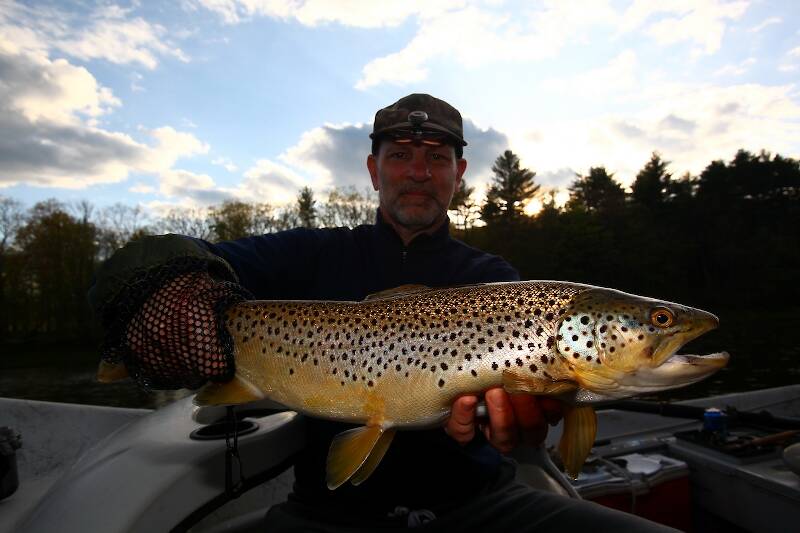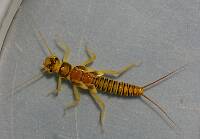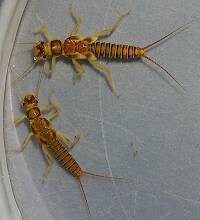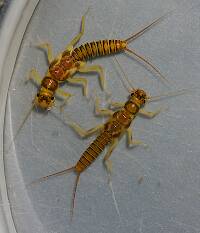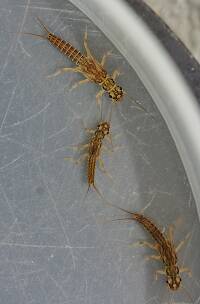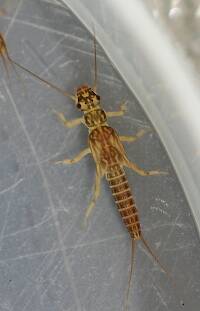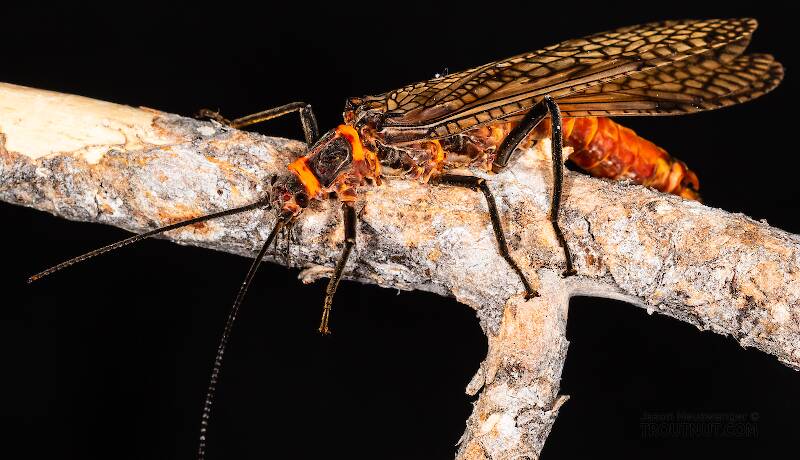
Salmonflies
Pteronarcys californica
The giant Salmonflies of the Western mountains are legendary for their proclivity to elicit consistent dry-fly action and ferocious strikes.
Featured on the forum
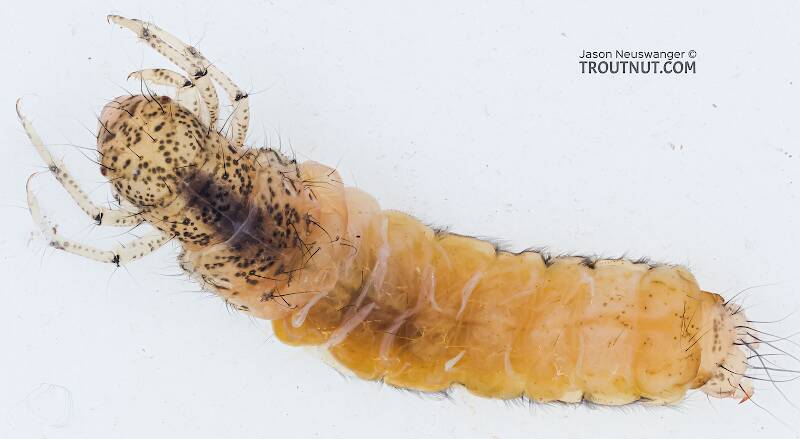
This is a striking caddis larva with an interesting color pattern on the head. Here are some characteristics I was able to see under the microscope, but could not easily expose for a picture:
- The prosternal horn is present.
- The mandible is clearly toothed, not formed into a uniform scraper blade.
- The seems to be only 2 major setae on the ventral edge of the hind femur.
- Chloride epithelia seem to be absent from the dorsal side of any abdominal segments.
Based on these characteristics and the ones more easily visible from the pictures, this seems to be Grammotaulius. The key's description of the case is spot-on: "Case cylindrical, made of longitudinally arranged sedge or similar leaves," as is the description of the markings on the head, "Dorsum of head light brownish yellow with numerous discrete, small, dark spots." The spot pattern on the head is a very good match to figure 19.312 of Merritt R.W., Cummins, K.W., and Berg, M.B. (2019). The species ID is based on Grammotaulius betteni being the only species of this genus known in Washington state.
- The prosternal horn is present.
- The mandible is clearly toothed, not formed into a uniform scraper blade.
- The seems to be only 2 major setae on the ventral edge of the hind femur.
- Chloride epithelia seem to be absent from the dorsal side of any abdominal segments.
Based on these characteristics and the ones more easily visible from the pictures, this seems to be Grammotaulius. The key's description of the case is spot-on: "Case cylindrical, made of longitudinally arranged sedge or similar leaves," as is the description of the markings on the head, "Dorsum of head light brownish yellow with numerous discrete, small, dark spots." The spot pattern on the head is a very good match to figure 19.312 of Merritt R.W., Cummins, K.W., and Berg, M.B. (2019). The species ID is based on Grammotaulius betteni being the only species of this genus known in Washington state.

Troutnut is a project started in 2003 by salmonid ecologist Jason "Troutnut" Neuswanger to help anglers and
fly tyers unabashedly embrace the entomological side of the sport. Learn more about Troutnut or
support the project for an enhanced experience here.
Barbaube on Jan 27, 2020January 27th, 2020, 7:26 am EST
Hi!
I live and fish in France in an area where intensive agriculture is practiced heavily, as in most places in Western Europe. A recent study from Radboud University in the Netherlands has shown that in only 10 years, insect numbers have declined in Western Europe as far as 80% in some cases. According to them, the biggest culprits are pesticides, which makes sense since pesticides are made to kill insects.
I agree with their observations. I haven't seen a real hatch in my local river, ever. Just a few bugs flying around. But every old fisherman I meet that fished the same spot 40 years ago tell me how great the hatches were and how insects slowly disappeared. Some pesticides have already been banned in the European Union. I think it is a smart thing to do. I believe all synthetic pesticides should be prohibited, and organic agriculture encouraged.
Do you have similar problems in the US? Have you noticed a drop in insect activity in your streams? What's your view on Organic agriculture, pesticides, etc. Let me know, I am curious!
N.
I live and fish in France in an area where intensive agriculture is practiced heavily, as in most places in Western Europe. A recent study from Radboud University in the Netherlands has shown that in only 10 years, insect numbers have declined in Western Europe as far as 80% in some cases. According to them, the biggest culprits are pesticides, which makes sense since pesticides are made to kill insects.
I agree with their observations. I haven't seen a real hatch in my local river, ever. Just a few bugs flying around. But every old fisherman I meet that fished the same spot 40 years ago tell me how great the hatches were and how insects slowly disappeared. Some pesticides have already been banned in the European Union. I think it is a smart thing to do. I believe all synthetic pesticides should be prohibited, and organic agriculture encouraged.
Do you have similar problems in the US? Have you noticed a drop in insect activity in your streams? What's your view on Organic agriculture, pesticides, etc. Let me know, I am curious!
N.
Martinlf on Feb 2, 2020February 2nd, 2020, 1:12 am EST
I fully agree, but doubt there will be complete bans on pesticides. Right now I am very troubled that Trump is getting rid of all the protections on streams he can, promoting pollution that threatens not only insects, but fish, and humans. It will take a change in administration to put my fears about this to rest. Many factors seem to affect hatches, including temperature. Climate change is yet another threat. I've seen declines in some hatches, and in fish populations on one of my favorite streams. Others don't seem to be as affected, and on one a favorite caddis hatch seems to be increasing, or at least moving upstream. There are too many variables for me to be able to make any claims with certainty, but I believe we need to reduce synthetic chemicals of all types, if possible. We know some are harmful, and others we don't understand as well may be even worse in the long run. Better safe than sorry the old saying goes. I agree.
"He spread them a yard and a half. 'And every one that got away is this big.'"
--Fred Chappell
--Fred Chappell
Barbaube on Feb 18, 2020February 18th, 2020, 4:56 am EST
Better safe than sorry, you said it @Martinlf! I had the chance to fish Colorado, Oregon, and Washington 3 years ago. The landscapes and the quality of the fishing left me in awe. American nature is a real treasure. That's a shame some politicians don't realize it. Anyway, let's stay positive and good luck!
Quick Reply
Related Discussions
Topic
Replies
Last Reply
3
Jun 17, 2017
by JohnR
by JohnR
6
Jan 12, 2012
by Jmd123
by Jmd123
6
Nov 12, 2006
by Martinlf
by Martinlf
3
Jul 5, 2017
by Crepuscular
by Crepuscular
4
May 11, 2017
by Millcreek
by Millcreek
Re: One should report fishing report even when not much to report... 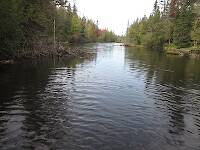
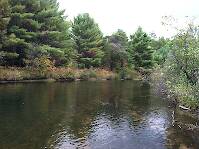
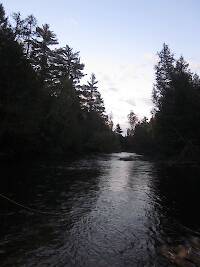
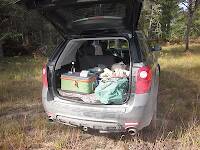

In the Photography Board by Oldredbarn
+ 2





In the Photography Board by Oldredbarn
15
Oct 3, 2012
by Entoman
by Entoman

